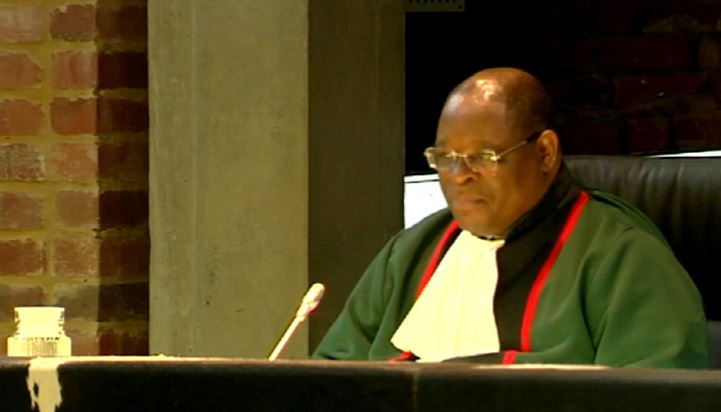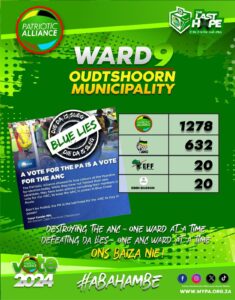By: Paul Ngobeni
Acting Chief Justice Zondo has unquestionably crossed the line of judicial ethics by wading into a tussle with Minister Lindiwe Sisulu over her newspaper opinion piece she published a week ago. In condemning Sisulu for her political writings and engagement in public discourse Zondo brought the judiciary into further disrepute. But first, we must confront Zondo’s false statements and hypocrisy.
The whites leading the Democratic Alliance have repeatedly insulted Judge President Hlophe of the Western Cape and – former Premier Zille called him an “ANC deployee.” Zondo was the Deputy Chief Justice and he never called a press conference to condemn the said attacks on his fellow senior jurist. In the same vein, retired Constitutional Court judge Kriegler has publicly stated that Judge President Hlophe “should not only be impeached but he should also be prosecuted and jailed for defeating the ends of justice.” There was a deafening silence from Zondo and Kriegler has even been granted a hallowed status as a “friend of the Court” in the ongoing litigation involving JP Hlophe. Are we entitled to conclude that obsequious Zondo is very solicitous of the rights of whites to attack and insult a senior black judge president but will act with alacrity and harshness if the culprit is a black senior ANC politician like Sisulu?
These uncomfortable questions vindicate the view of those who argue that Zondo should have acted with circumspection before wading into the political controversy arising from Minister Sisulu’s political comments. It reinforces the view of the modern-day post-1994 black judge acting as harsh monitor of blacks utterances but a benevolent enforcer and protector of white privilege and domination – he is quick on the trigger when it comes to menial offences by blacks but would ignore far more serious offences committed by whites against black judges.
Also read: We have legitimised wrongdoing under the umbrella of the rule of law; writes Lindiwe Sisulu
Ironically the judiciary itself has recognized the temptation of some judges to be extremely deferential to white racist judge Kriegler in certain circumstances. In National Director of Public Prosecutions and others v Freedom Under Law 2014 (4) SA 298 (SCA)) the SCA criticized Judge Murphy on para. 18 as follows: “…What I do find somewhat perturbing is the court’s high praise for Dr Mamphela Ramphele and Justice Johan Kriegler who deposed to FUL’s founding and replying affidavits respectively (see para 4). It needs to be emphasised that all litigants, irrespective of their status, should be treated equally by our courts. Judges must therefore be wary of creating the impression – which would undoubtedly be unfounded in this case – that they have more respect for some litigants or their representatives than for others.” Zondo has, perhaps unwittingly, reinforced the view that citizens who criticize judges are to be treated differently based solely on their skin colour – if they are white they are freely exercising their constitutional rights and if they are black they must be publicly censored, condemned, and even be fired from their jobs. His defence of the dignity of judges does not extend to some judges likes Judge President Hlophe. Judges such as Yacoob and Moseneke have publicly called President Zuma a “fool” and a rapist but there was deafening silence from Zondo. Why should anyone take him seriously when he purports to be angered by far less insults and a mere opinion piece in a newspaper?
Frantz Fanon in “Black Skin, White Masks” eloquently summarized Zondo’s type of cognitive dissonance as follows: “Sometimes people hold a core belief that is very strong. When they are presented with evidence that works against that belief, the new evidence cannot be accepted. It would create a feeling that is extremely uncomfortable, called cognitive dissonance. And because it is so important to protect the core belief, they will rationalize, ignore and even deny anything that doesn’t fit in with the core belief.” Zondo purports to be aggrieved by Sisulu’s writings and claims that Minister Lindiwe Sisulu has grievously insulted the judiciary with an article labelling judges as “mentally colonised Africans”. Zondo claimed that the article went beyond criticism or an attack and constituted the worst insult hurled at the institution in memory. “This is not just criticism, it is an insult.” That begs the question – why is it not an insult and attack on judicial independence to publicly accuse Hlophe JP of being an “ANC deployee” and a criminal walking? Is it because these statements emanate from whites and not blacks? Why is Zondo’s judicial sensitivity only triggered when the persons hurling the alleged insults are black and why is that not evidence of a mentally colonized calibrated reaction? There shall be robust debates on these issues and things must change under Sisulu’s leadership!
On Zondo’s flouting of judicial ethics, I must point out that if we were in a well-functioning democracy subject to the rule of law, Zondo’s forays into the realm of politics would subject him to severe sanctions including impeachment.
To be perfectly clear, judges in other democratic countries frown upon such amateurish dabbling in politics by judges. Former Canadian Chief Justice Laskin has eloquently summed up his opposition to judges becoming involved in political debates off the bench. He emphatically stated that “[a] judge has no freedom of speech to address political issues which have nothing to do with his judicial duties. His abstention from political involvement is one of the guarantees of his impartiality, his integrity, his independence … . He cannot be allowed to speak from the shelter of a Judgeship.” B. Laskin, “Berger and Free Speech of the Judge” (Address to Canadian Bar Association Annual Meeting, 2 September 1982), cited in A.W. MacKay, “Judicial Free Speech and Accountability: Should Judges Be Seen but Not Heard?” (1993) 3 NJ.C.L. 159 at 213.
The pivotal question is whether Judge Zondo’s attacks on Sisulu for her opinions in party political debates raises the specter about judicial entanglements in the poisoned ANC factional politics and whether Judge Zondo further brings the judiciary into disrepute when he violates the duty to act in a reserved manner. In Ruffo v. Conseil de la magistrature, [1995] 4 S.C.R. 267, the Canadian Supreme Court, independently of a factual situation which was not before it, defined the duty to act in a reserved manner in para. 107 as follows, per Gonthier J; The duty of judges to act in a reserved manner is a fundamental principle. It is in itself an additional guarantee of judicial independence and impartiality and is aimed at ensuring that the public’s perception in this respect is not affected. The value of such an objective can be fully appreciated when it is recalled that judges are the sole impartial arbiters available where the other forms of dispute resolution have failed. The respect and confidence inspired by this impartiality therefore naturally require that judges be shielded from tumult and controversy that may taint the perception of impartiality to which their conduct must give rise. (emphasis added.)
Also read: Judge Raymond Zondo’s outrage is misplaced
Mr. Justice Gonthier further pointed out that the duty to act in a reserved manner had been enshrined in principle at the international level in various documents, including the Basic Principles on the Independence of the Judiciary (published by the United Nations Department of Public Information in 1998), which provides inter alia:
8. In accordance with the Universal Declaration of Human Rights, members of the judiciary are like other citizens entitled to freedom of expression, belief, association, and assembly; provided, however, that in exercising such rights, judges shall always conduct themselves in such a manner as to preserve the dignity of their office and the impartiality and independence of the judiciary. (Emphasis by Gonthier J.)
In common with the other ethical standards which judges must apply to their conduct both in and out of court, the ultimate purpose of the duty to act in a reserved manner is to sustain the litigant’s confidence in the judiciary so as to ensure the permanence of the rule of law (Ruffo, supra, para. 108). The Bangalore Principles of Judicial Conduct (Bangalore Principles) were endorsed by the United Nations at the 59th session of the United Nations Human Rights Commission at Geneva in 2003. Their purpose is to establish standards of conduct for judges. They provide in relevant parts:
a) Judicial Independence
Extra-judicial statements upon politically contentious matters are not appropriate if the judge’s involvement could reasonably undermine confidence in his or her impartiality on a matter that could come before the court, if it might unnecessarily expose the judge (and the judiciary) to political attack, or if the status of judicial office is used.
Under the heading “Extra-judicial activities” the guidelines note that:
The days are past when an appointment to the judiciary compelled social and civic isolation…Effective judges should not be isolated from the communities they serve. Judges are also entitled to private and civic lives which are not disadvantaged by the office. On the other hand, a judge’s conduct, both in and out of court, inevitably attracts closer public scrutiny than that of other members of the community. And the standing of the judiciary is adversely affected by conduct which, for others, might not attract serious criticism. Judges must therefore accept some restrictions on conduct and activities as a consequence of appointment.
It is fallacious for Zondo to assert that as a Chief Justice he has the right and duty to publicly engage in mudslinging to vindicate the judiciary or under the circumstances. As a subject of constant public scrutiny, a judge must accept personal restrictions that might be viewed as burdensome by the ordinary citizen and should do so freely and willingly. In particular, a judge shall conduct himself or herself in a way that is consistent with the dignity of the judicial office. Judges are not given unbridled license to intervene o extra-judicial matters especially when the statements made out of court concern matters of public controversy. It is intuitively obvious that a judge’s involvement in political debates could reasonably undermine confidence in his or her impartiality.
In Zondo’s case, he is currently moonlighting as Acting Chief Justice while at the same time serving as a Chairperson of a Commission and writing a report on “State Capture” which has divided the ANC along factional lines.
Simultaneously, Zondo is also a candidate for the vacant position of Chief Justice, and President Ramaphosa, a leader of a faction opposed to Sisulu, has the ultimate decision-making responsibility to ensure Zondo’s promotion. Political parties and commentators have already characterized Zondo’s actions as brown-nosing and naked attempt to ingratiate himself with Ramaphosa who has the sole power to elevate him to the position he covets. Based on public debates following Zondo’s utterances, it is clear his involvement has unnecessarily exposed the judge or the entire judiciary to political attacks and is inconsistent with the dignity of judicial office.
Undeniably, the duty to act in a reserved manner, as well as the image of impartiality and integrity which the judiciary must project, require that judges refrain from entering the arena of political controversy. Zondo flagrantly violated this admonition. Zondo should have examined his own conduct in light of the perception of the public and litigants before calling a press conference to condemn Sisulu. In Ruffo v. Conseil de la magistrature, above, the Canadian Supreme Court imposed this responsibility on every judge, at para. 106: “Furthermore, the responsibility for determining what behaviour best reflects the requirements inherent in this duty, and for adopting that behaviour, lies primarily with each judge, whose appointment is a sign of confidence in him or her personally.”
And finally, Zondo may have committed a direct violation of Article 11 (Restraint and Improper Influence) of the Code of Judicial Conduct. This provision requires inter alia, that a judge must “…(b) not enter into a public debate about a case irrespective of criticism levelled against the judge, the judgment, or any other aspect of the case; (c) refrain from any action which may be construed as designed to stifle legitimate criticism of that or any other judge;… e) avoid any personality issues with colleagues, lawyers, and parties, …” Although the speech by Zondo relates not to an extant case in litigation, Zondo’s conduct is more egregious because he not only abused his judicial powers to chastise, condemn and even seek job termination of a citizen simply because he disliked her opinion piece in a newspaper. Lest we forget, Sisulu has previously been labelled a very strong supporter of President Zuma who has been targeted by Zondo in the past year. Zondo further decried the fact that the opinion piece was not anchored on “facts”. What judge would be ignorant of the fact that an opinion piece is not a Ph.D. dissertation that must be supported by statistics and citations to creditable sources and empirical facts?
And finally, a pertinent question is why the General Council of the Bar of South Africa (GCB) has endorsed Zondo’s action and called on Minister Sisulu to withdraw her comments on the judiciary and to issue a public apology? Its white chairperson, Craig Watt-Pringle is unconcerned about the double standards and does not care that the GCB has remained indifferent to and has been a party to the venomous attacks by whites against Judge President Hlophe.
The organisation echoed many others in saying that President Cyril Ramaphosa ought to act decisively to defend the judiciary in opposition to such assaults and any repetition thereof by members of his Cabinet. There you have it. The GCB will not bother to issue public statements in cases where whites attack or insult black judges. In fact, recently, a white litigant wrote to Judge President Maya of the SCA imploring her judges to stick an apology up their “arse” and there was no statement emanating from these hypocrites about such crude insults to judges.
Clearly, black people cannot allow their liberation project to be dictated to by such immoral racists who have no compunction about flagrant double standards. As Fanon admonished us a long time ago: “For a colonized people the most essential value, because the most concrete, is first and foremost the land: the land which will bring them bread and, above all, dignity” [The Wretched of the Earth]. At the same time, he warned that colonized people perpetuate their condition by striving to emulate the culture and ideas of their oppressors. He wrote, “Imperialism leaves behind germs of rot which we must clinically detect and remove from our land but from our minds as well.”
This view was echoed by Paulo Freire, author of “Pedagogy of the Oppressed” who stated, “The oppressed want at any cost to resemble the oppressors.” He said, “the oppressed must be their own example” and that “those who authentically commit themselves to the people must re-examine themselves constantly” [Pedagogy of the Oppressed]. Whites in the GCB who are steeped in racism and supremacist ideas cannot be paragons of virtue or moral rectitude. Nor are they equipped to lecture black people on the rule of law and constitutionalism. Finish and klaar.








[…] Also read: Has acting Chief Justice Zondo crossed the ethical line in attacks on Minister Sisulu? […]
Zondo is fucken mad, he thinks his God and we are scared of that fat fucker ,Zondo and his judiciary can go to he’ll and Fuck themselves we are sick of their bullying tendancies